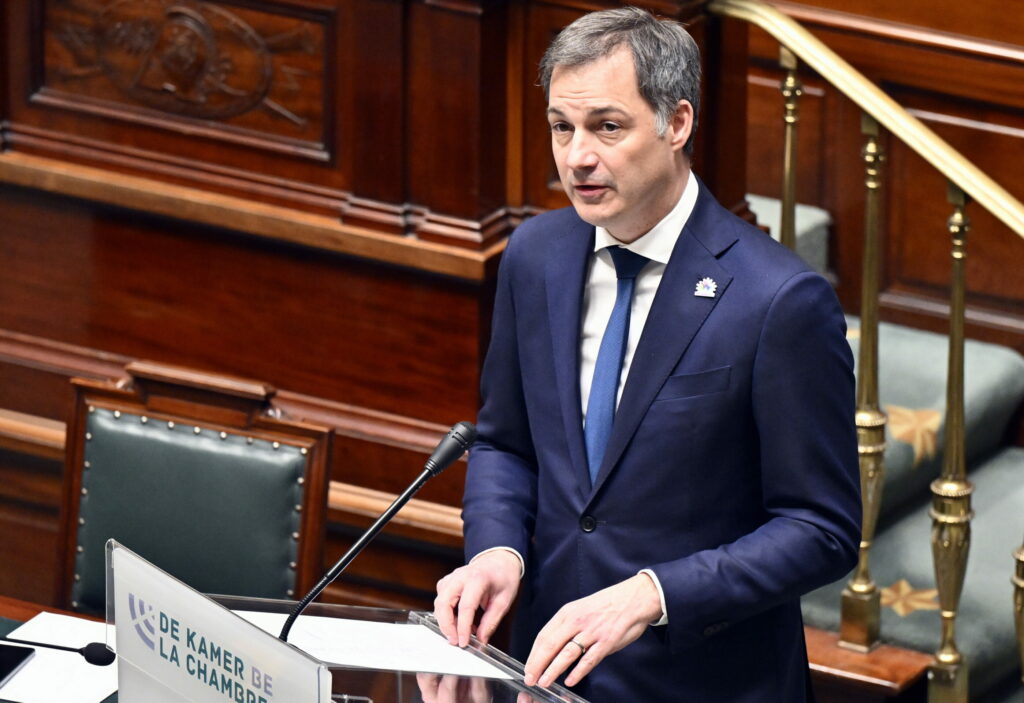Belgian Prime Minister Alexander De Croo addressed the Federal Parliament on Friday over the controversial events surrounding the far-right National Conservative Conference (NatCon) in Brussels this week.
Responding to an oral question, the Belgian leader welcomed the Council of State's decision to reverse the order of the Saint-Josse mayor Emir Kir to ban the NatCon fundraiser, on the grounds of security.
De Croo relayed his take on the events, saying he intervened after getting off a plane, being informed of the situation, and speaking to the Saint-Josse mayor on the phone.
"A mayor, in this case, Emir Kir, made a decision based on a competence he has: namely, ensuring public order in his municipality. That is indeed within his authority, he is allowed to take that kind of decision, and bases it on reports he receives about it."
But De Croo stressed that these decisions must always be taken in accordance with other more general principles, such as freedom of assembly and the right to free speech.

People attend the NatCon National Conservatism Conference, at the Claridge, in Sint-Joost-ten-Node/ Saint-Josse-ten-Noode, Brussels, Tuesday 16 April 2024. Credit: Belga / James Arthur Gekiere
"I am happy that the event was able to go ahead, and I hope everyone in this room is happy that that event was able to go ahead. Not because of what was said there, which I absolutely do not agree with," the Belgian Prime Minister told MPs.
"But because the right to associate and the right to free speech should not be something that we invoke when it suits us and do not invoke when it does not suit us. That is the essence, those are the basic values."
'How it works'
The reasoning of the Council of State stipulated that the mayor should have made every effort to ensure that that conference could go ahead, and that he could have have taken a decision to ban the event but then also allow the counter-demonstration to go ahead.
"That is how it works in a democracy," De Croo claimed. "With the rule of law, a body like the Council of State can say mayor, you have made a mistake, and there you must ensure that that event can go ahead."
However, the Belgian Antifascist Coordination (CAB) responded to these claims on Thursday by pointing out that "far-right policies remain a mortal danger" for the fundamental rights of many different groups. "We therefore have a legitimate right to defend ourselves and to organise actively against them."
But in his response, De Croo told the Federal Parliament that the right to assembly and freedom of speech "should not be politicised".
"We cannot use our fundamental rights only when it suits us," the liberal politician said. "We democrats can be expected to have a clear line in that, even if it is events where things are told that people do not agree with."

Former British MEP Nigel Farage pictured during the NatCon National Conservatism Conference, at the Claridge, in Saint-Josse-ten-Noode, Brussels, Tuesday 16 April 2024. Credit: Belga / James Arthur Gekiere
De Croo also responded directly to criticisms from Vlaams Belang MP Barbara Pas, who in a statement had referred to De Croo as a "mop" and tried to draw a correlation between the incident and "what laws against 'hate speech' will be used for" by progressives.
"Do allow me to say that I have no lessons to learn from your party," the liberal politician said. "A party that, in Flanders, would like to install hotlines in schools if there are teachers who say something that Vlaams Belang does not like. So don't come and give me lessons now [about freedom of speech]."
One question not addressed by the Belgian liberal prime minister is whether the far-right can be treated as an honest broker in civic democratic participation, something which is often underlined by antifascist groups as a reason behind their mobilisation.
"It takes great audacity for the worst authoritarians to hide behind freedom of speech when their entire political project is based on repression and prohibition," the CAB said in a statement. "We asserted loud and clear what had been said after the Second World War and which many people seem to have forgotten: Never again!"

